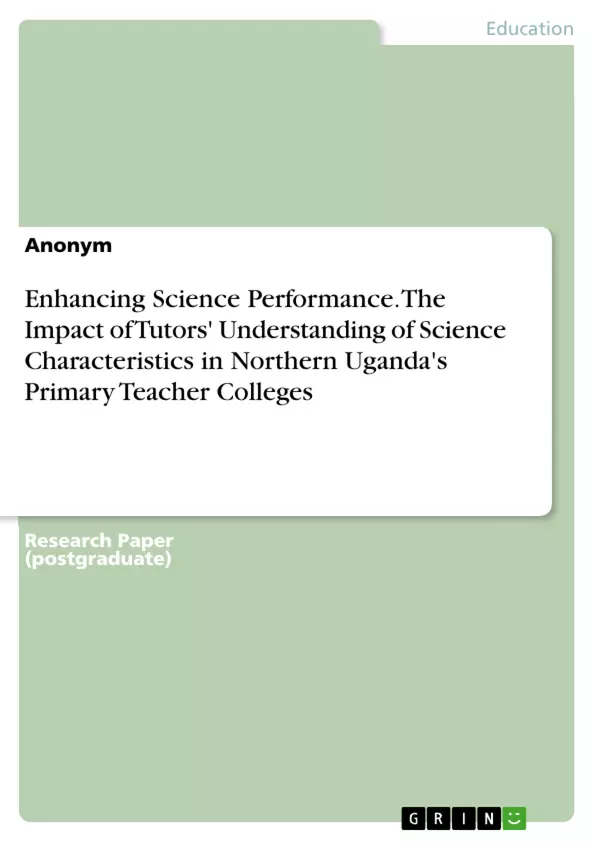With the goal of enhancing science education and addressing poor performance in primary teacher colleges in Northern Uganda, this study explores the influence of tutors' understanding of the characteristics of science on their instructional roles and subsequently, science performance.
Amid the global emphasis on science literacy skills as a fundamental goal of education, this research presents an unexplored case in Northern Uganda's eight primary teacher colleges. Prior studies affirm that a strong understanding of science's features among teachers significantly impacts student learning, a theory this research intends to investigate within the Ugandan context. In addition to presenting background information, the rationale, and significance of the issue, this study will delve into the research questions, related literature, conceptual framework, methodology, study population area, sample and sampling procedure, data collection and analysis, assumptions and limitations of the study, ethical considerations, and the research project time schedule.
Inhaltsverzeichnis (Table of Contents)
- 1.0 Introduction
- 1.1 Background
- 1.2 Statement of the problem
- 1.3. Rationale of the study
- 1.4 Significance of the study
- 1.5 Objectives of the study
- 1.6 Research Questions
- 2.0 Related Literature
- 2.1 Literature Review
- 3.0 Methodology
- 3.1 Design of the study
- 3.2 Study sample and area
- 3.3 Sample and sampling technique
- 3.4Methods of data collection
- 3.5 Analysis of data
- 3.6 Credibility and trustworthiness
- 3.7 Assumptions of the study
- 3.8 Limitations of the study
- 3.9 Ethical considerations
- REFERENCES
Zielsetzung und Themenschwerpunkte (Objectives and Key Themes)
This research project aims to assess the level of understanding of the characteristics of science among graduate science tutors in primary teacher training colleges in Northern Uganda. The study will investigate the potential influence of this understanding on tutors' instructional practices and consequently, student performance in science.
- The importance of science literacy for societal development
- The role of teachers' understanding of the characteristics of science in promoting student learning
- The impact of instructional practices on students' understanding of science
- The need for effective interventions to support science teachers in their instructional practices
- The relationship between teachers' knowledge of the characteristics of science and student performance in science
Zusammenfassung der Kapitel (Chapter Summaries)
- Chapter 1: Introduction: This chapter provides a general background on the importance of science education and its link to societal development. It highlights the need for scientific literacy and discusses the significance of teachers' understanding of the characteristics of science in promoting effective teaching practices. The chapter further outlines the specific research problem, its rationale, significance, and objectives. It concludes with the research questions guiding the study.
- Chapter 2: Related Literature: This chapter presents a review of existing literature relevant to the study, focusing on existing research findings and theoretical frameworks surrounding the characteristics of science, teacher understanding of these characteristics, and their impact on student learning. It draws on various sources to establish a foundation for the proposed study.
- Chapter 3: Methodology: This chapter details the research design and methodology used to collect and analyze data. It outlines the study area, sample selection, data collection methods, data analysis procedures, and the study's ethical considerations.
Schlüsselwörter (Keywords)
This research focuses on the characteristics of science, science education, teacher training, science literacy, instructional practices, student performance, primary teacher training colleges, Northern Uganda.
Frequently Asked Questions
What is the focus of the study in Northern Uganda?
The study investigates how tutors' understanding of the characteristics of science affects their teaching and the performance of students in teacher colleges.
Why is scientific literacy important?
Scientific literacy is considered a fundamental goal of education as it is essential for societal development and informed decision-making.
Does a teacher's knowledge influence student learning?
Yes, the research is based on the theory that a strong grasp of science features among teachers significantly improves how students learn and perform.
What methodology was used in this research?
The study uses a specific research design involving data collection from eight primary teacher colleges, including sampling procedures and ethical considerations.
What are the limitations of the study?
The study acknowledges certain assumptions and limitations regarding its sample size and the specific regional context of Northern Uganda.
- Arbeit zitieren
- Anonym (Autor:in), Enhancing Science Performance. The Impact of Tutors' Understanding of Science Characteristics in Northern Uganda's Primary Teacher Colleges, München, GRIN Verlag, https://www.grin.com/document/1366237



